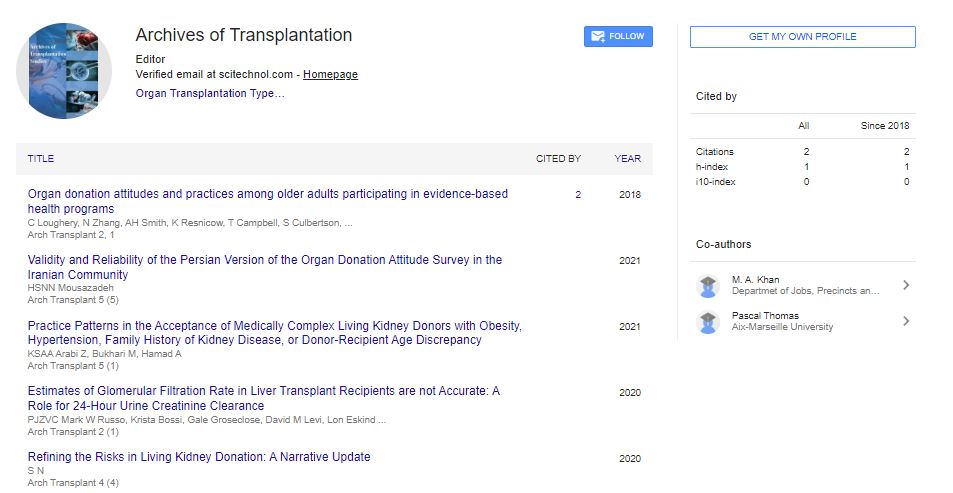Perspective, Arch Transplant Vol: 7 Issue: 2
Innate and Adaptive Immune Responses in Transplantation
Kawther Alquadan*
1Department of Medicine, University of California, California, USA
*Corresponding Author: Kawther Alquadan,
Department of Medicine, University
of California, California, USA
E-mail: kawther@hotmail.com
Received date: 23 May, 2023, Manuscript No. AT-23-107818;
Editor assigned date: 26 May, 2023, PreQC No. AT-23-107818 (PQ);
Reviewed date: 12 June, 2023, QC No. AT-23-107818;
Revised date: 19 June, 2023, Manuscript No. AT-23-107818 (R);
Published date: 26 June, 2023 DOI: 10.4172/AT.1000144
Citation: Alquadan K (2023) Innate and Adaptive Immune Responses in Transplantation. Arch Transplant 7:2.
Description
Success of transplantation depends up on balance between the immune response of the recipient and the acceptance of the transplanted organ. It examines the roles of innate immune cells, such as natural killer cells and macrophages, as well as adaptive immune cells, including T cells and B cells. By understanding the intricate relationship between these immune responses, we can appreciate the complexities of graft acceptance and rejection in transplantation. The innate immune response is the first line of defense against foreign invaders, including transplanted organs. Innate immune cells, such as Natural Killer (NK) cells and macrophages, play essential role in graft recognition and initiation of immune responses. NK cells are capable of detecting cells lacking self-Major Histocompatibility Complex (MHC) molecules, which are present on most healthy cells. During transplantation, NK cells assess the expression of MHC molecules on the transplanted organ. If MHC molecules are absent or aberrantly expressed, NK cells recognize the organ as foreign and initiate a cytotoxic response to eliminate it.
Macrophages also contribute to the innate immune response in transplantation. They scavenge the transplanted organ for foreign antigens and release pro-inflammatory cytokines to initiate an immune response. Macrophages are crucial in activating adaptive immune cells and promoting the recruitment of additional immune cells to the graft site. The adaptive immune response plays a central role in the recognition and rejection of transplanted organs. It involves the activation of T cells and B cells, which provide a targeted and specific response against donor antigens. T cells are critical players in graft rejection. They recognize donor antigens presented by donor-derived Major Histocompatibility Complex molecules (MHC). T Cell Receptors (TCRs) on the surface of T cells bind to the donor antigens, initiating a cascade of immune responses. CD4+ T cells, also known as helper T cells, facilitate the activation of other immune cells and orchestrate the immune response. CD8+ T cells, or cytotoxic T cells, directly kill donor cells expressing the foreign antigens.
B cells also contribute to the adaptive immune response in transplantation. They produce antibodies that recognize and bind to donor antigens. This process, known as antibody-mediated rejection, can activate complement proteins and induce inflammation and damage to the transplanted organ. B cells can also act as antigenpresenting cells, stimulating T cell responses and amplifying the immune reaction. The interplay between T cells and B cells in transplantation is complex and dynamic. T cells provide help to B cells for antibody production, while B cells present antigens to T cells for their activation. This collaborative effort between T and B cells leads to the development of specific immune responses against the transplanted organ.
To prevent graft rejection, immunosuppressive medications are commonly used to dampen the immune response in transplantation. These medications target both the innate and adaptive immune responses, inhibiting the activation and proliferation of immune cells involved in graft rejection. By suppressing the immune response, immunosuppressive drugs help maintain graft function and promote long-term graft survival. However, achieving complete immune tolerance, where the recipient's immune system accepts the transplanted organ as "self" without producing an immune response, remains a significant challenge. Immunosuppressive drugs can have adverse effects and may not prevent chronic rejection, which can occur even with immunosuppression.
Emerging research focuses on inducing immune tolerance in transplantation. This involves promoting the development of regulatory T cells, which suppress immune responses and promote tolerance to the transplanted organ. Other strategies aim to modulate the interactions between innate and adaptive immune cells to promote immune tolerance.
